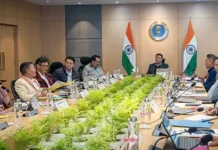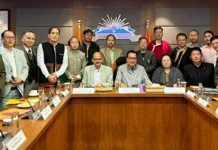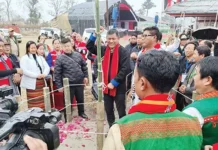[ Tongam Rina ]
Call it naivety or a smart political move, Chief Minister Pema Khandu literally stirred a hornet’s nest by stating that the Arunachal Pradesh Freedom of Religion (APFR) Act or the Anti-Conversion Law passed in 1978 will be scrapped. He did not just suggest, he actually said that the act would be brought up in the next legislative assembly session for repeal.
Rabid reactions were bound to follow from religious organisations, starting with the Indigenous Faith and Cultural Society of Arunachal Pradesh and the Arunachal Christian Forum – the two opposing ends of the spectrum.
While the debate will die down in a while, it remains to be seen whether the act will actually be taken up in the next assembly session. Rather unlikely, given the current political scenario, and also pressure from the right-wing BJP’s ideological wing, RSS, which over the decades has been the self-anointed messiah of the ‘indigenous’ identity.
While Arunachal remains a fertile ground for those seeking newer pasture for organized religions and new identities, one must give in to the fact that Arunachalees will do exactly what they like and choose what they like, including new religions and cultures – depending on the mood, of course.
Many Arunachalee homes are multilingual (those where people of the older generation still speak their language) and multi-religious. It’s by choice, not by force. Mutual respect for diversity has kept our society together. Unlike other states of the region, Arunachal can take pride in the fact that there rarely have been large-scale incidences of communal violence in the state, despite its being home to dozens of tribes of different cultures.
That’s the beauty of our state, though we might not appreciate it because it’s normal for people to choose their food habits and religious beliefs.
And, if one looks at the current generation, it’s not the Hindu or the Christian or the Muslim way of life, or even religion, but Korean and Japanese pop culture that has literally taken over.
While the engaging debate on the APFR Act continues, it is perhaps time we took a look at how we have conveniently abandoned our tribal languages, the repository of our culture.
Tribal languages are still not taught in schools in the state, and there has been no tangible effort by the state government, or by the organizations that claim to be the champions of their communities, to propagate tribal languages or even introduce them in schools.
By now, our children in schools should have been able to read stories in their languages. It’s Hindi that’s taken over our homes and English that is taught in schools. What is so indigenous about it? Why holler about identity when languages, which are the very core of identity, have been conveniently forgotten?
Religion remains a personal choice in Arunachal, and it should be as it has been; it’s our languages that are dying a slow death. The popular saying, ‘Loss of culture is loss of identity’ needs to be reframed in Arunachal as ‘Loss of language is loss of culture and identity’.
We are almost on the verge of losing it, and many families have lost it already as Hindi and English have completely taken over. How many of you reading this article actually speaks your language with your family members? When you debate about culture, is it in Hindi, English or in your own language, the hallmark of your identity?
Culture changes with the times. The current culture among the youngsters is Korean and Japanese pop culture. Maybe with time, an African culture which is akin to the Arunachal tribal culture will find its footings in the state someday. Shall we start a discussion on ways and means to save our dying languages?
In the meantime, take out time and go to any place of worship – Donyi Polo or a church. They are organized and ritualistic, yet there is nothing indigenous about any of the organized religions in Arunachal. It’s all the same.





